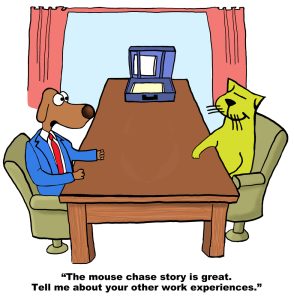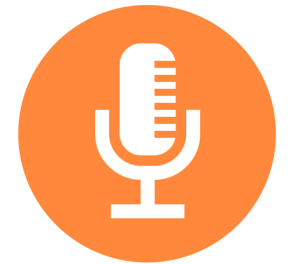[vc_row][vc_column][vc_single_image image=”11154″ img_size=”large”][vc_column_text]
Every job interview has the possibility to be a defining moment in your career, and brevity can help you succeed when others fall flat. In this week’s episode of my Just Saying podcast — Job Interviews: No Time for an Interrogation — I discuss how candidates can stand out by turning the interview into a conversation.
Most people — including candidates AND the interviewer — don’t really enjoy job interviews. They can often feel stiff, overly formal and even unnatural. When the interviewer asks all the questions, it can almost seem more like an interrogation.
 Relax: It’s a Conversation
Relax: It’s a Conversation
But, it doesn’t have to be that way. One of the most effective ways to set yourself apart is to turn any interview into a relaxed, informative conversation. Here are three ways to do that:
1. Be ready for the easy starter/opening question. Most interviews begin with the interviewer saying something like: “So, Joe, it’s great to meet you — tell me a little bit about yourself.” That question needs a prepared answer. Do not wing it. I’m not suggesting you read it from a script, but do have a word or phrase that appropriately defines who you are, such as: “I’m hard working,” “I’m creative,” and make it the center of your answer. Keep this initial answer short: 30-60 seconds, max. Whatever you say, be sure you can defend it and own it with some examples. If the interviewer is taking notes, you want this to be a key takeaway.
2. Be a storyteller. Think of a few short stories that will define what you’ve accomplished in your career. These stories should focus on your central idea (see #1, above) and bring it to life. If you tell the interviewer you are creative, share a story to exemplify how creativity plays a big part in your job. These vignettes should be 20-30 seconds in length. I structure them using the P-A-R method: the Problem you were facing; how you Approached that problem, and how you Resolved the problem. This method makes your stories easy for you to remember and easy for the interviewer to understand.
3. Prepare some of your own questions. Many interviewers wrap up the interview by asking, “Do you have any questions for me?” Yes. You should always have a couple of prepared questions. Again, this should be a conversation in which both parties give and take. Use this opportunity to qualify the opportunity and make sure it’s right for you. Questions such as: “Why do you like working here?” or “What characteristics make a person successful in this job?” could help you understand more about the position and open the door to continued conversation with the interviewer.
I hardly ever remember the candidate where I do all the talking and it feels like an interrogation. But I always remember a great conversation!
 I’m “Just Saying,” Subscribe to the Podcast!
I’m “Just Saying,” Subscribe to the Podcast!
Just Saying is relaxed, informal, optimistic and funny, and you can subscribe to it on iTunes or listen to episodes as they are released on The Brief Lab website.
If you enjoy it, please share and subscribe through iTunes so you’re always up to date on the latest episode!
About the author: Joe McCormack is on a mission to help progressive organizations master concise communication. Joe works with fortune 500 companies and elite special operations units, is the founder of The Brief Lab and author of Brief: Make a Bigger Impact by Saying Less. Follow us on Twitter @TheBriefLab
[/vc_column_text][/vc_column][/vc_row]